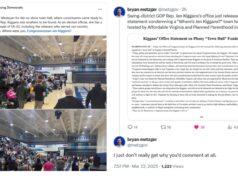 Dana Milbank in today’s Washington Post has a brilliant send up of how Donald Trump, if he were the Democratic candidate, would have handled a hack of the DNC server, with a release of damaging information on an anti-secrecy website. With his natural ear for mimicry, Milbank creates exactly how to spin a Trump-like conspiracy theory to discredit the leakers and hackers. Here is a sample:
Dana Milbank in today’s Washington Post has a brilliant send up of how Donald Trump, if he were the Democratic candidate, would have handled a hack of the DNC server, with a release of damaging information on an anti-secrecy website. With his natural ear for mimicry, Milbank creates exactly how to spin a Trump-like conspiracy theory to discredit the leakers and hackers. Here is a sample:
A lot of people have said Putin is trying to get Trump elected so he can blackmail the American president. Somebody told me Trump would completely go out of business if Putin took back all the Russian money he let Trump have. I don’t know exactly what’s going on, but I just heard Trump’s airplane would be grounded immediately.
Manafort helping the oligarchs? Flynn having dinner with Putin? Page getting money from Gazprom? No coincidence! Now it’s coming out that Putin wants to destabilize America. There’s something fishy about the whole thing.
And why did Trump propose changing NATO and Ukraine policy in ways that would benefit Putin? Obviously some people think it’s evil intentions. I think it’s incompetence. Regardless, a lot of people think it’s evil intentions.
I don’t bring up the possibility that Trump has already been bribed or blackmailed by Putin because I don’t know enough to really discuss it.
On a more serious note, the New York Times today confirmed that the hackers were Russian state intelligence agencies, the FSB and GRU. What is harder to prove is their intentions or link to the actual leak. As the article points out, the hack occurred back when Trump’s campaign was first starting and few people seriously thought he would end up the nominee. But what originally may have started as the type of routine spying that most countries, including ours, engage in to keep tabs of friends and foes alike, could have metastasized into more aggressive efforts to destabilize our electoral process when the right set of circumstances presented itself. From a forensic perspective, a connection may never be proven with a high-enough legal standard to prosecute anybody.
But that doesn’t mean a solid case couldn’t be built from circumstantial evidence that something deliberate occurred to influence a U.S. election and that it involved a foreign adversary. There are too many coincidences not to raise some red flags (really, no pun intended).
To start with, Putin nurses grievances against Hillary Clinton. He still blames her for denouncing the outcome of a 2011 Russian election for fraud. In addition to his antipathy to Clinton, Putin has good reason to favor Trump, who has expressed admiration for the Russian dictator. Trump, who displayed little interest in the Republican Platform at his convention, interfered to change one section expressing strong support for NATO. Every Republican and Democratic convention going back to NATO’s creation has supported it. Trump also has said on numerous occasions that he would reconsider honoring our commitments to defend Baltic states from Russian aggression or to defend democracy in Ukraine.
There’s good reason for that too. Trump’s campaign manager Paul Manafort was a strategist for Viktor Yanukovych, who was ousted from the presidency of Ukraine by reformers who wanted closer alliances with Western Europe and the EU. Yanukovych currently lives in exile in Russia.
Carter Page, another Trump close adviser, worked as a consultant for Gazprom, the Russian state-owned gas company. Gazprom, by the way, cut off oil supplies to Ukraine after the ouster of Yanukovych to sow chaos in that country while Russia was invading Crimea.
Besides all these and many more ties between Trump advisors and Russian oligarchs and mob figures, columnists like Chris Cillizza, in the Washington Post, and James Fallow, in The Atlantic, are calling for Trump to release his tax returns. These journalists are raising questions about whether Trump himself is hiding financial ties with Russia. One theory goes that Trump cannot borrow money to fund his projects from American banks, a plausible suspicion given his four bankruptcies, making him a poor credit risk in this country.
In addition to all this, Julian Assange, the founder and senior editor of WikiLeaks, openly admits he timed the release of the damaging emails to coincide with the Democratic Convention to harm Clinton’s candidacy. His antipathy for her grows from the fact that she condemned his prior release of a trove of State Department correspondence and damaging military and intelligence documents that put our national security at risk. Of course, Assange claims to be a passionate advocate for open governments and transparency. And I believe he started out that way before developing grievances against the Obama administration as well as Clinton.
Indeed, running afoul of U.S. espionage laws landed one of his sources, Chelsea Manning, in U.S. prison, another, Edward Snow, in exile in Russia, and himself holed up in an Ecuadorian embassy in London. With all that, they are constrained from showing the same enthusiasm for the release of Russia’s secret documents, despite the fact that Putin’s record for freedom of press, openness, honest government, and basic human rights is severely lacking to say the least. And Putin has by far a worse record than Obama for interfering in other nations’ autonomy.
Assange has gone from being a hero of the liberal and libertarian movements for championing true transparency to being willing to throw an American election to benefit a despot. Indeed, Franklin Foer, in Slate, makes a strong case that this leak of the DNC emails was far less about openness (after all, a political party is not a government agency) than it was partisan campaign dirty trick. He likens it to a cyber-Watergate.
Watergate was the scandal that brought down the Nixon administration. It began when burglars were caught trying to steal damaging information from the DNC, which had offices in the Watergate Building, to use against Democratic candidate George McGovern in the 1972 election.
Milbank goes into all this in his parody conspiracy theory. But as even he knows, it’s not funny that Julian Assange may in truth have become nothing more than a cyber-version of G. Gordon Liddy. But at least, the Nixon crew kept it all domestic. They truly believed the anti-war McGovern would have weakened American defenses. With Liddy, Nixon, et al, there never was a question that they were working to benefit a foreign adversary by making America weaker. That is a whole new level of dirty trick. Even Tricky Dicky never, ever went there. He just wanted to win, not destabilize and harm the country.



 Sign up for the Blue Virginia weekly newsletter
Sign up for the Blue Virginia weekly newsletter
![“Skilled” at Breaking the Law: “This latest attempt to sidestep any regulations or oversight shows [that ‘skill’ game developers] have no interest in acting responsibly or in good faith.”](https://bluevirginia.us/wp-content/uploads/2024/10/krizekskilled-238x178.jpg)
![Kamala Harris for Virginia 2024 Director Jake Rubenstein: “This [Donald Trump] is the man @GlennYoungkin sold his soul to”](https://bluevirginia.us/wp-content/uploads/2024/08/jakesoldsoul-238x178.jpg)






